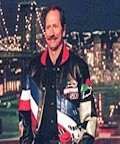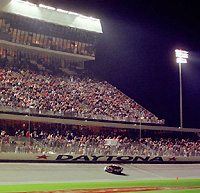 |
|
Earnhardt runs under the
lights
NASCAR Online
Daytona Beach, Florida (February 7,
1998)
 |
Dale tested out Daytona's new lighting system Saturday night, turning 20 laps around the speedway. |
The list of milestone
moments for Dale Earnhardt at Daytona International Speedway -- a collection as lengthy as
any in motorsports -- got a little longer Saturday night as the seven-time NASCAR Winston
Cup Series champion became the first driver to run under the speedway's new lighting
system.
Earnhardt turned 20 laps in a three-year-old race car, "the backup, backup car,"
as he called it, approaching speeds of 193 mph in the cool evening air. The exhibition,
which was free, attracted a crowd estimated somewhere between 15,000 and 20,000. Many were
leftovers from the first round of Bud Pole Qualifying, in which Earnhardt posted the
fourth-fastest time.
Cheers greeted the driver with more race wins here (29) than any other as he walked onto
pit road with team owner Richard Childress and crew chief Larry McReynolds at
approximately 6:31 p.m. EST. He greeted the fans with his customary wave, and after a
brief interview, fired the throaty SB2 engine in pursuit of history.
He followed the pace car for two laps, then ran 18 alone on the track, its lead-gray
surface shimmering under the glow of the 191 towers which flank the 2.5-mile circuit.
"It's pretty impressive and it's a pretty great honor," Earnhardt said.
"It's really a first-hand look at what the lights are like. At 50 percent of what
they're going to be like, it's pretty good. ... It's going to be great when they do finish
it."
The system is designed by Musco Lighting, which installed the permanent lighting at
Charlotte Motor Speedway in 1992 and the Rose Bowl for the World Cup soccer tournament in
1994. Each of those venues presented significant challenges, but of the Daytona project,
company president Joe Crookham said "there is nothing of this magnitude in the
world."
Work will be completed for the July 4 Pepsi 400, making it the first race in history to be
broadcast in prime time. Construction will resume in March following the completion of
Speedweeks 1998.
The crowd was able to listen to Earnhardt's radio conversation with McReynolds and
Childress on the public address system. It erupted when Earnhardt told them in the midst
of a lap, "I'm ready to race now."
Adding to his enthusiasm was the discovery that the track was easier to see under the
night lights than in the sunshine of midday.
"You can see it better than in the daylight," he said. "It's a real
consistent look and feel. It really brings the track out to you. You can see the track
perfectly."
Sunday, Feb. 15 will mark Earnhardt's 20th attempt to win the "Great American
Race."
© 1998 Unimount Enterprises
